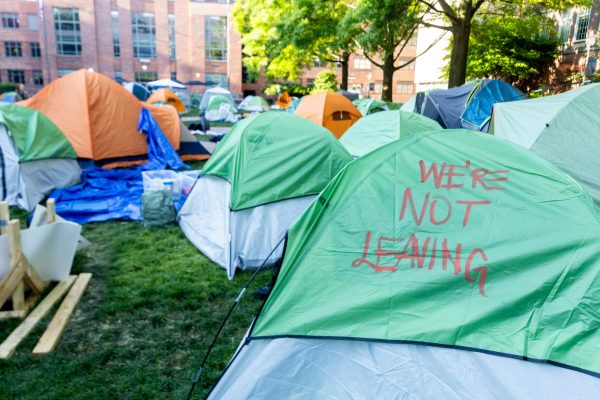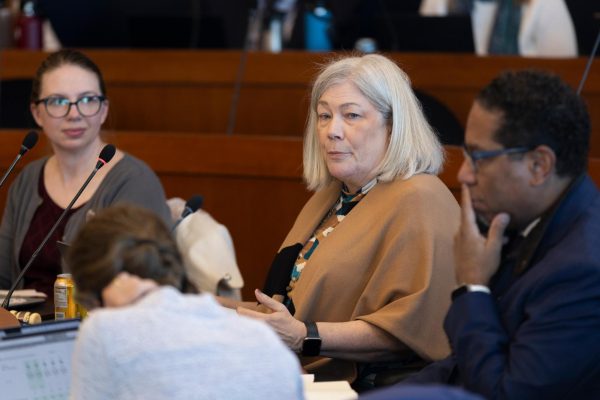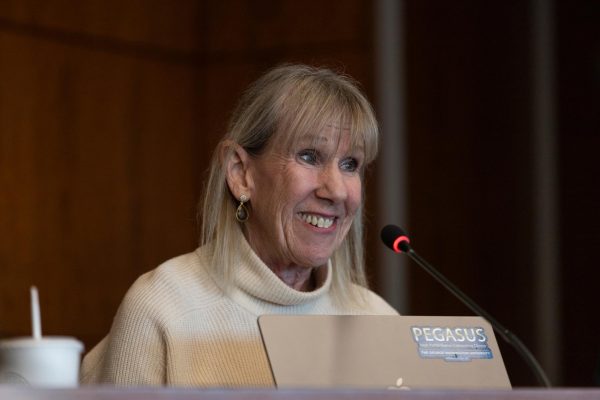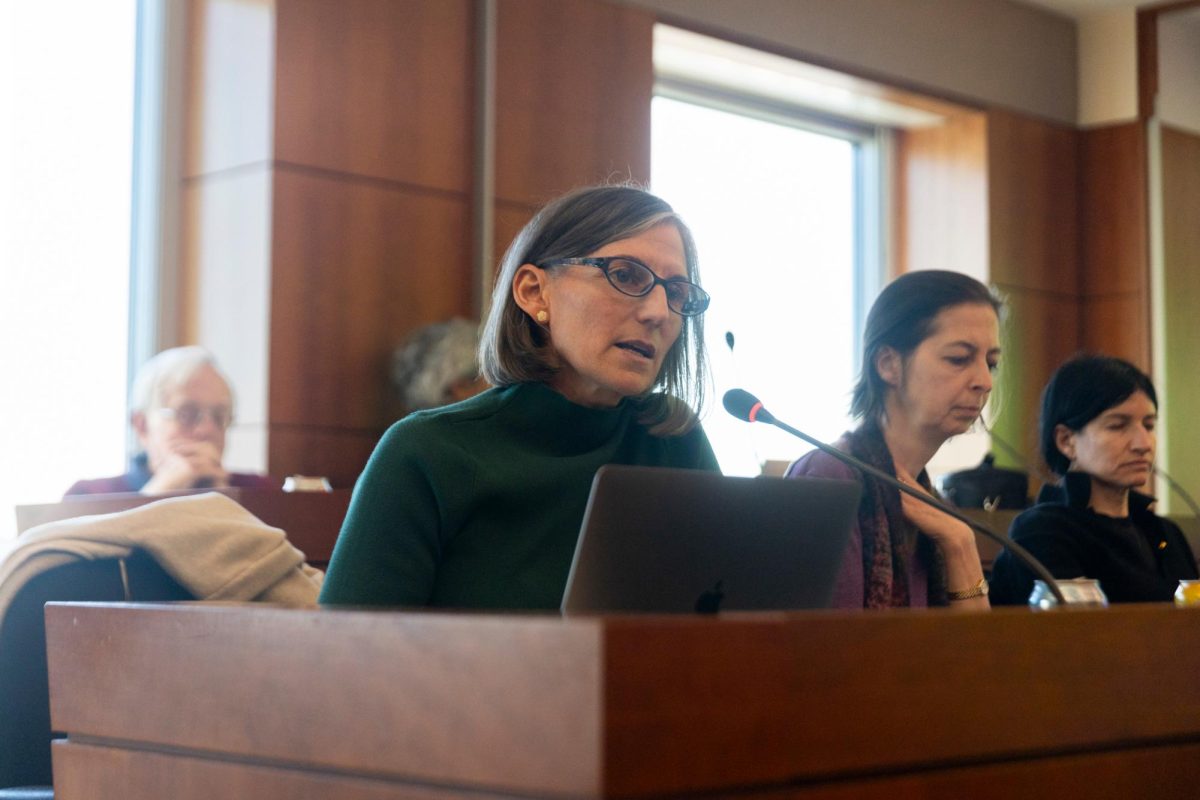The Faculty Senate on Friday passed a resolution endorsing recommendations made by a subcommittee that identified discrepancies between students’ and officials’ accounts of the disciplinary and legal proceedings for protesters arrested at the pro-Palestinian encampment.
The Faculty Senate unanimously passed resolution 25-6, introduced by Educational Policy and Technology Committee Co-Chair Sarah Wagner, that called on the body to endorse the subcommittee’s recommendations, including that the University use the interim suspension process in a “politically neutral way.” The EPT committee voted unanimously during their January meeting to advance the resolution to the Faculty Senate after reviewing the feedback they received from the body when Wagner and EPT co-chair Irene Foster presented the report at its December meeting.
The subcommittee’s recommendations include that the University support all students in their educational endeavors, avoid removing educational resources from students unless they’re posing a threat to the University and have officials commit to increased transparency, communication and consultation with its faculty on matters that “impact instruction.”
“Modest as they may seem, EPT feels they provide important guidance going forward for the University’s strong commitment to support our students in pursuing their educational endeavors,” Wagner said.
The report also recommends that the Conflict Education & Student Accountability office not engage in “collective punishments,” hold each student accountable for their own actions, specify information that is relevant in a conduct case and give students sufficient time to review all evidence against them.
GW sanctioned nine student organizations in August for their alleged involvement in the encampment, according to a recently updated list of student organizations with conduct violations. The University found all nine organizations responsible for community disturbance, access without authorization, disorderly conduct, noncompliance and misconduct related to property as a result of hosting an “unapproved” encampment in University Yard, according to the sheet.

Don Parsons, a faculty senator and professor of economics, unanimously passed an amendment to the resolution, which changed the resolving clause from referencing the committee’s recommendations in an appendix to presenting the recommendations as bullet points under the clause.
Parsons introduced two other amendments to add additional recommendations to the resolution, including making information about students committing “transgressions” against other students transparent, but failed to gain a second sponsor to move the body to a vote.
Among the discrepancies highlighted in EPT’s December report is a contrast between General Counsel Charles Barber’s statement that the University did not “have a position” on the stay away agreements issued to arrested students and claims from students and their legal counsel that the U.S. Attorney’s Office said GW requested the orders. The report also outlines that students said the University didn’t respond to their exemption requests to access on-campus spaces, despite Barber saying the U.S. Attorney’s Office granted all exemptions.
University President Ellen Granberg said in her report that officials launched two new websites to provide information and guidance to community members on the impact of President Donald Trump’s executive orders on research, diversity, equity and inclusion, anti-semitism, immigration enforcement and Title IX.
She said the University joined as a co-plaintiff onto a lawsuit led by the Association of American Universities, the American Council on Education and the Association of Public and Land-Grant Universities against the National Institutes of Health’s decision to set a 15 percent cap on “indirect funding” covered by grants — which usually covers a University’s overhead and administrative research costs.
“GW opposed the proposed action not only because of its impact on research on health but on the grounds that it is arbitrary and capricious and a violation of federal statutes and regulations,” Granberg said.
She said the judge in the case has issued a temporary restraining order pending a hearing next week, and the NIH issued a memo saying they will abide by their existing fiscal year 2025 policies until further notice from the courts.
The Faculty Senate moved into an executive session to close its meeting after Wagner motioned to discuss further the impact of executive orders on the University.

Granberg said the University will release a public version of a report investigating claims made by former GW Police Department officers of gun safety violations, insufficient firearm training and a poor working environment in mid-March. She had previously said during the December Faculty Senate meeting that she planned to receive the report in January and share it with her cabinet and the Board of Trustees in February, adding that the firm the University hired to conduct the investigation was almost finished reviewing documents and completing interviews.
She said some information regarding the investigation will be kept confidential from the public because of personnel matters related to the investigation.
Wagner said that during an EPT meeting in January, the committee heard plans for the possible implementation of Follett Access, a program that would provide students access to textbooks for a flat fee. She said EPT members had “major reservations” about the program, which officials would implement during the fall 2025 semester.
“We feel that it actually undermines our very efforts that we at EPT wish to support from Libraries and Academic Innovations, their efforts to enhance educational resources and lower costs for access to educational resources and lower costs for students,” Wagner said.

Geneva Henry, vice provost for libraries and information technology, said the program is a “great idea,” adding that students could opt out of the flat fee that the University would otherwise automatically charge to their bill. She said federal regulations would require the University to make it clear to students that they have the ability to opt-out of the program and its costs.
Katrin Schultheiss, a faculty senator and associate professor of history, questioned Provost Chris Bracey about the lack of EPT and faculty consultation on the academic calendar and officials’ decision to close campus for snow. She said officials’ late decision to make Election Day a University holiday and the recent snow days “threw a wrench” in a lot of professors’ syllabi.
University Registrar Katie Cloud said the office creates the calendar in input from a calendar committee, comprised of representatives from the Graduate School of Education and Human Development and the Columbian College of Arts and Sciences.
Terry Murphy, deputy provost for academic affairs, said she is “open” to having the chair of the EPT committee sit on the calendar committee after Faculty Senator Phil Wirtz said he sat on the committee during his time as chair.
Bracey said a group of senior leaders determine when there’s a snow day and take into account recommendations from the GW Safety Office and predictive weather information.
Ilana Feldman, a faculty senator and chair of the Faculty Senate Executive Committee, said Bracey shared with the committee during their January meeting a draft of guidelines about the process for policy revisions in response to a senate resolution passed last September requesting officials consult faculty on newly proposed policy changes that affect faculty, students and the educational and research enterprise of the University.
She said the Executive Committee provided initial comments to Bracey and recommended the Professional Ethics and Academic Freedom Committee review them. PEAF had brought the initial resolution to the senate last September.
Granberg introduced the Staff Council’s new president Kim Fulmer to the senate. Dean of Students Colette Coleman introduced University Chaplain Kristen Glass Perez and Simran Kaur-Colbert, Director of the Center for Interfaith and Spiritual Life.
Hannah Marr, Sachini Adikari, Fiona Riley and Rachel Moon contributed reporting.





